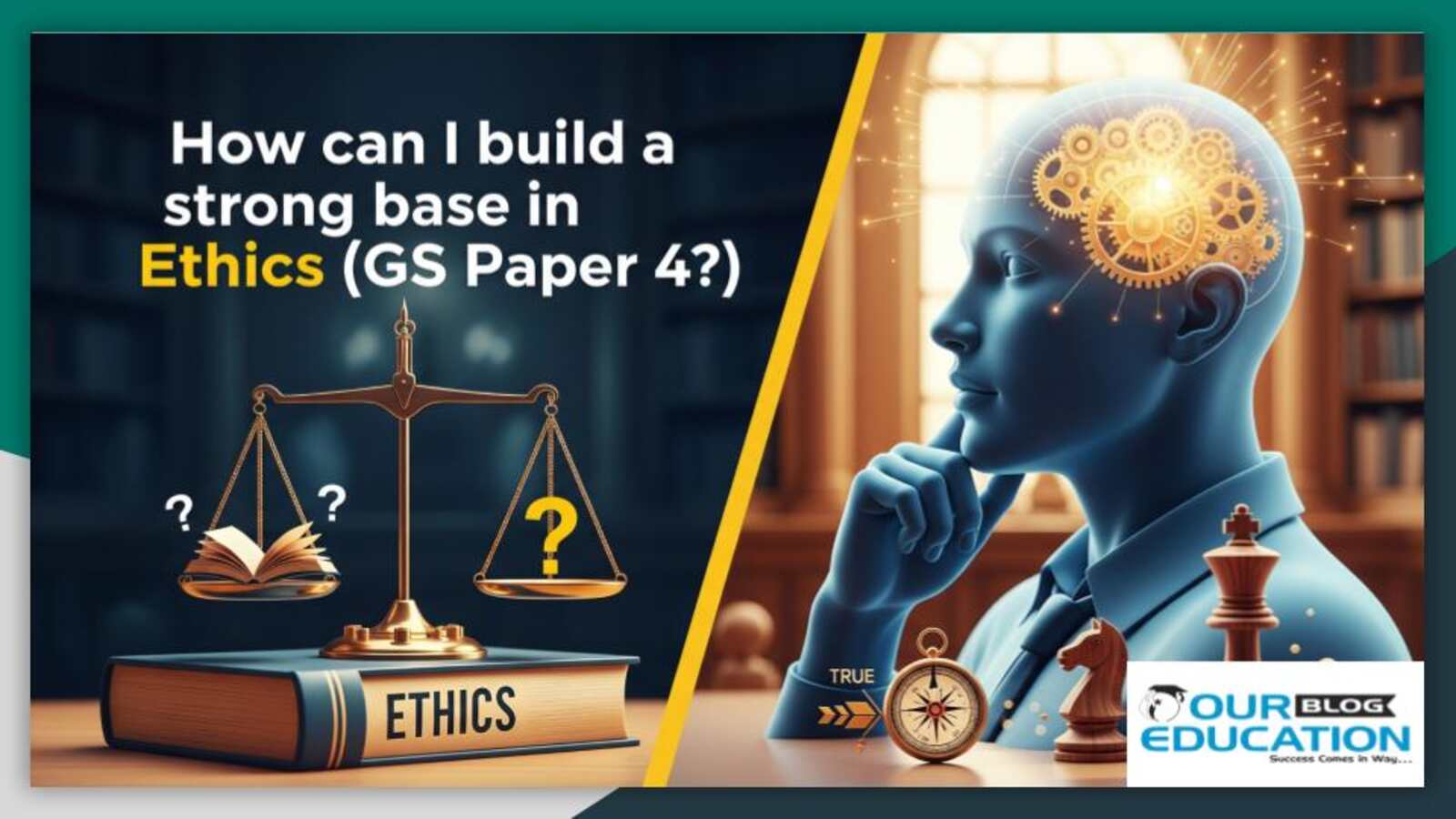
How can I build a strong base in Ethics (GS Paper 4)?
Ethics GS Paper 4: Common General Studies Paper 4: Ethics, Integrity, and Aptitude holds a distinct and pivotal role in the UPSC CSE Test. It is not just about superficial knowledge but tests one’s moral fibre-the ability to analyse ethical dilemmas-and the aptitude for public service. Many aspirants find it difficult to build a strong base in Ethics GS Paper 4, which is often regarded as a subjective paper. But with the right approach and diligent preparation, one can build a stronghold and get good marks.
Build a strong base in Ethics (GS Paper 4)
To build a strong foundation in Ethics GS Paper 4, one needs to do a little more than just cover the syllabus; one needs to look into understanding the core concepts and applying them to real-life situations and gradually build a finer ethical view. Here is a stepwise approach for you to achieve this:
1. Analyse the Syllabus of Ethics GS Paper 4 as well as its Interlinkages:
First, thoroughly review the official UPSC syllabus for Ethics in GS Paper 4. Learn to pay attention to keywords and their interlinkage with other topics, such as Ethics and Human Interface, Attitude, Aptitude, Emotional Intelligence, Public/Civil Service Values, Ethics in Public Administration, Probity in Governance, and Case Studies. Recognise how philosophical underpinnings relate to practical applications in governance.
2. Grasp Foundational Ethical Theories and Thinkers:
Develop a solid grasp of fundamental ethical theories — utilitarianism, deontology, virtue ethics — and ascertain how they pertain to decision-making. Be acquainted with ethical theorising by prominent men and women scholars of the Indian and Western traditions. One does not have to go deep into philosophy to study these; yet, having a working knowledge of these will give you a strong analytical framework while grappling with ethical dilemmas and case studies.
3. Focus on Conceptual Clarity:
To an extent, Ethics GS Paper 4 is less about memorising and more about understanding conceptual frameworks related to integrity, honesty, empathy, compassion, accountability, transparency, and objectivity. Aim to be conceptually clear by studying standard textbooks, NCERTs (especially those on political science and sociology), articles, etc. Do not hesitate to refer to multiple sources so that you get a broader perspective at least.
4. Tie Ethics to Everyday Situations:
Arguably, the application of ethical principles to practical and real-life situations is the crux of Ethics GS Paper 4. Start observing and thinking about ethical dilemmas in life, news, and current affairs. Consider A discussion of the different stakeholders, ethical dilemmas, and options available, along with consequences to choices, will build your analytical and case-solving skills.
5. Developing the Right Attitude and Emotional Intelligence:
The Attitude and Emotional Intelligence module highlights personal qualities for public service. Reflect upon your own values, beliefs, and prejudices. Understand Emotional Intelligence’s components (self-awareness, self-regulation, motivation, empathy, and social skills) and how they contribute to ethical behaviour and governance.
Plutus IAS: Your Partner in Building a Strong Ethics GS Paper 4 Foundation
Located in Noida, Uttar Pradesh, Plutus IAS understands the distinct demands of Ethics GS Paper 4 and, in turn, offers exhaustive coaching to prepare aspirants with a strong ethical foundation through:
- Clear Conceptualisation: Faculties at Plutus IAS explain the core ethical theories and concepts in great depth and connect these to practical implications.
- Interactive Discussions: Sessions in the classroom encourage participation through discussions and debates on deeper conceptual premises of ethical dilemmas.
- Focus on Case Study Analysis: Plutus IAS aims to emphasise the development of a systematic approach toward solving case studies in dedicated sessions and exercises.
- Very Good Study Material: Their well-researched study material offers a consolidated resource for all aspects of the Ethics GS Paper 4 syllabus.
- Regular Mock Tests and Evaluation: Plutus IAS conducts a strong test series with detailed evaluation and feedback, which further refines the skills of the students to write answers and helps them identify their strengths and weaknesses in Ethics GS Paper 4.
- Mentorship and Guidance: Experienced mentors at Plutus IAS provide personal guidance in developing an ethical outlook and working through individual problems faced in preparing for this paper.
10. Cultivating An Ethical Mindset:
The strong base of Ethics GS Paper 4 is finally about building an ethical mindset. Self-reflection, embracing divergent opinions, and a deep-going investigation into the ethical implications of your actions and decisions will all be necessary.
Conclusion
The road to excelling in Ethics GS Paper 4 must be shaped by these approaches while utilising facilities like Plutus IAS. Ethics thus becomes a foundation that must not only help one do well in the UPSC CSE but also make one a better and more morally responsible civil servant. Consistent effort, conceptual clarity, and practical application of ethical principles are thus the three cornerstones on which success in this vital paper rests.
Follow the Blogoureducation Channel on WhatsApp
To get the latest updates, connect with the Education YouTube channel
Related article
Summary

How can I build a strong base in Ethics (GS Paper 4)?
Description
This article will provide you the strategies on How can I build a strong base in Ethics (GS Paper 4)?
Author
Rishutosh
Blog Oureducation
Publisher Logo

« How many mock tests will be sufficient for UPSC CSE Mains?



